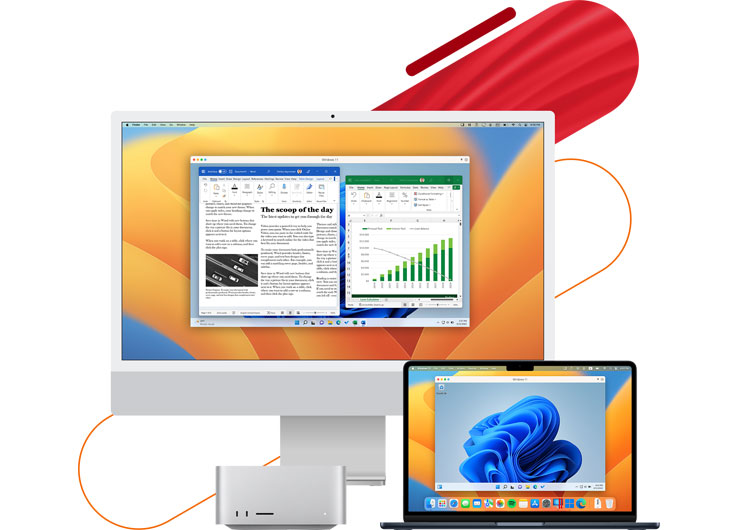

- #PARALLELS DESKTOP FOR MAC OS 10.7 MAC OS X#
- #PARALLELS DESKTOP FOR MAC OS 10.7 SERIAL#
- #PARALLELS DESKTOP FOR MAC OS 10.7 DRIVERS#
- #PARALLELS DESKTOP FOR MAC OS 10.7 UPGRADE#
- #PARALLELS DESKTOP FOR MAC OS 10.7 FULL#
This version also allowed users to boot their existing Boot Camp Windows XP partitions, which eliminated the need to have multiple Windows installations on their Mac.
#PARALLELS DESKTOP FOR MAC OS 10.7 MAC OS X#
A new feature known as Coherence was added, which removed the Windows chrome, desktop, and the virtualization frames to create a more seamless desktop environment between Windows and Mac OS X applications.
#PARALLELS DESKTOP FOR MAC OS 10.7 UPGRADE#
This version brought the ability for users with a Windows XP installation to upgrade to Windows Vista from within the VM environment. In addition, a shared clipboard and drag-drop support between Mac OS X and the guest OS was implemented.
#PARALLELS DESKTOP FOR MAC OS 10.7 FULL#
Full featured CD/DVD drives arrived in this version, which allowed the user to burn disks directly in the virtual environment, and play any copy-protected CD or DVD as one would in Mac OS X. The amount of video RAM allocated to the guest OS was made adjustable, up to 32MB. Version 2.5 brought support for USB 2.0 devices, which expanded the number of USB devices supported at native speed, including support for built-in iSight USB webcams.

The first official release of version 2.5 was on February 27, 2007, as build 3186. A 104-key Windows enhanced keyboard and a PS/2 wheel mouse.Up to eight USB 2.0 devices and two USB 1.1 devices,.An Ethernet virtual network card compatible with Realtek RTL8029(AS), capable of up to 16 network interface connections,.Up to three bi-directional parallel ports, each of which can be mapped to a real port, to a real printer, or to an output file,.
#PARALLELS DESKTOP FOR MAC OS 10.7 SERIAL#
#PARALLELS DESKTOP FOR MAC OS 10.7 DRIVERS#
Because all guest virtual machines use the same hardware drivers irrespective of the actual hardware on the host computer, virtual machine instances are highly portable between computers. Each virtual machine thus operates identically to a standalone computer, with virtually all the resources of a physical computer. Parallels Desktop for Mac is a hardware emulation virtualization software, using hypervisor technology that works by mapping the host computer's hardware resources directly to the virtual machine's resources. On January 10, 2007, Parallels Desktop 3.0 for Mac was awarded “Best in Show” at MacWorld 2007. Parallels agreed: “ Since we've got a great Mac product, we should make it look and sound like a Mac product.”, it was therefore renamed ‘Parallels Desktop for Mac’.

This name was not well received within the Mac community, where some felt that the name, particularly the term “workstation,” evoked the aesthetics of a Windows product. Its name initially was 'Parallels Workstation for Mac OS X', which was consistent with the company's corresponding Linux and Windows products. Released on June 15, 2006, it was the first software product to bring mainstream virtualization to Macintosh computers utilizing the Apple–Intel architecture (earlier software products ran PC software in an emulated environment). is a developer of desktop and server virtualization software. Parallels Desktop for Mac, by Parallels, is software providing hardware virtualization for Macintosh computers with Intel processors. Parallels Desktop 7 For Mac not only integrates with many of the new features in Lion, such as Launchpad and full-screen apps, the folks at Parallels have also been tweaking the code to provide higher performance, both in the basic virtualization application and in graphics performance. Other improvements in Parallels Desktop include Windows print page setup, volume control synchronization, and location services support. Parallels Desktop 13 crack also detects whether MAC or Windows is being used to open a particular file, and asks whether the file type should always open with that program. English, Chinese Simplified, Chinese Traditional, German, Russian, French, Spanish, Italian, Japanese, Brazilian Portuguese, Korean, Polish, Czech


 0 kommentar(er)
0 kommentar(er)
